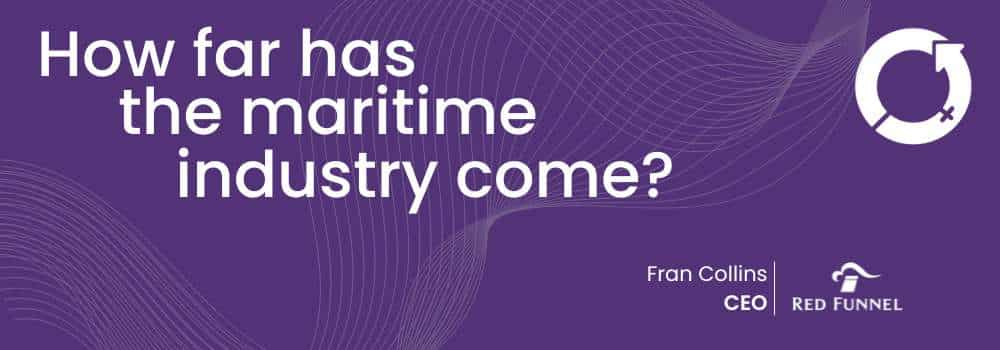Changing Course
Share this blog
Latest Maritime Vacancies
Global HR Director – Europe
Claims & Insurance Manager (Part-time) – London
Legal Counsel (Marine Operations) – London
Insurance Executive – Singapore
Operational and Commercial Pricing Analyst- London
IWD25 – How is the industry doing?

This International Women’s Day, we’re spotlighting the voices of CEOs, Directors, and Executive Leaders as they share their insights on the evolving maritime industry. With women still making up only around 30% of the workforce, progress toward gender equality continues—but there’s more to be done. We spoke with industry trailblazers about the initiatives in place to support women, the changes still needed to achieve true gender parity, and how the industry is adapting to attract and retain female talent.
Join us as we hear from Fran Collins, CEO of Red Funnel, on her perspective and experiences in shaping a more inclusive maritime sector.
How has the maritime industry changed when it comes to the attraction and retention of women in the sector?
I find this interesting, as on the face of it, while the percentage of women entering the global maritime industry has not significantly changed since I went to sea 1993, there is a noticeable increase in awareness of the career in the UK and the number of women joining the sector is increasing . The industry is now more widely recognized as a viable career option for all, including women, thanks to increased visibility and awareness. Initiatives by the Merchant Navy Training Board, The Chamber of Shipping, Maritime Transport Careers Partnership, and Careers at Sea Ambassadors are instrumental in promoting maritime careers to women and schools, helping to change the perception that it is a male-dominated field. I think we’re also benefiting now from increased numbers of women in senior ranks and roles which also normalises female presence across the industry. One other notable change is the range of support offered to women going to sea. Sadly there are still issues, but companies and organisations have put much more support in place. Industry-wide, I think we still have a way to go but we’re making progress and it’s starting to accelerate!
Have you put any practices in place to support women and their progression into leadership/advancement within their career?
At Red Funnel, we are committed to inclusivity and as part of enabling this, we have implemented a fully flexible working system to support our employees in their career progression. As a 24/7 business, our standard operations include shift work and normal office hours. However, we offer a hybrid working model that allows employees to work from home for 2-3 days a week for those not required on site. Additionally, we accommodate requests for flexible working hours to help employees manage childcare and other personal commitments, such as working core hours from 10:00 to 14:30 and adjusting the remaining hours around school runs etc. or job-share and part-time roles. We also promote natural progression within the company, with role models at every level demonstrating achievable career progression.
What do you think still needs to change when it comes to achieving gender parity in maritime?
Achieving true gender parity in the maritime industry is challenging because the lifestyle is always going to be such that it’s not going to appeal to everyone. However, as an industry, we need to be open, inclusive and attractive to all those who may be considering it as a career. As part of that inclusive culture, we need to have appropriate working policies, to ensure visible role models across the industry, and eliminate subconscious discrimination and bias. Training is also really important in helping change culture and normalise maritime as a career for everyone. I think that advances in technology and automation, which reduce the need for specific physical attributes, may naturally lead to greater gender parity, but we cannot rely on this alone. The key factors are fostering inclusive attitudes and behaviours, alongside policies that promote equal pay and opportunities for all talent.